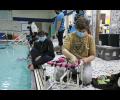By Lizzy Hahn
On October 19 and 21, 2021, the Nome-Beltz Robotics class had the opportunity to build and test their hand made ROVs, short for remotely operated underwater vehicles.
Lauren Bien and Nicole Webster with the Prince William Sound Science Center in Cordova came up to Nome to teach students about ROVs. They brought tool kits for the students to be able to make their own ROV out of common materials anyone can find at a hardware store. The students made their ROVs on Tuesday and tested them out in the pool on Thursday. They had a series of tasks their ROVs had to complete. “What we’re doing this week with the different groups is called the remotely operated vehicle challenge, ROV challenge, so that is a way to take hands-on science and bring it into the classroom,” Nicole Webster said. “The students essentially make what are underwater robots to complete a series of tasks that are designed around the idea of servicing an oil station — the oil station in Valdez, where they put oil onto the takers at the end of the pipeline. They have a series of challenges to do that, kind of mimic what a real ROV would do in that situation [oil spill]. So, they have to inspect the berth of the boat, they have to attach an anchor chain, take pictures, clean up a small oil spill — we don’t put oil in the pool — and just kind of get a sense of both an engineering challenge and real world application in the learning environment.”
The oil spill was demonstrated using ping pong balls. The students had to corral the balls and pick them up as a part of their multiple ROV tasks. Their tasks included driving forward about five feet, moving up and down, drive through a hula hoop and back out of the hula hoop, attach an “anchor” hoop to a stationary cactus made out of PVC pipes, as well as retrieving ping pong balls out of the water.
Bien has been to Nome once before in 2018 to teach the same ROV program. “Our ROV program is kind of this traveling, hands-on, STEM project that we can take around the state to schools or communities that are interested,” said Bien. Usually Bien is reaching out to schools, but Justin Heinrich remembered them coming to Nome in 2018. “We haven’t been able to travel for the last two years with this program and we really didn’t think we would, so to have a teacher and school reach out to us, was really great.”
In addition to teaching the program in Mr. Heinrich’s class, they also worked with ACSA students on Thursday, Oct. 22.
Credit: Source link




















